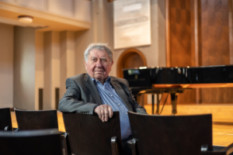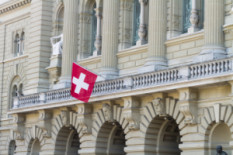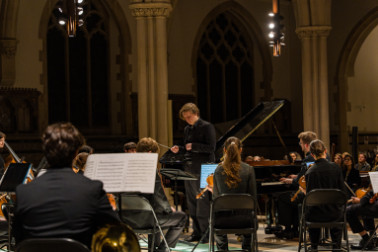The idea that art should become a significant component, or even the heart, of children's education is very powerful. This idea forms the foundation of the MUS-E ® program.
This unique program was created by the renowned violinist and humanist Yehudi Menuhin, together with Werner Schmitt, Vice President of the Yehudi Menuhin Foundation, and Marianne Ponselle, Poncelet Executive Vice President of the Foundation, back in 1993. It is based on the concept that music, like other forms of art, should be an integral part of universal education, accessible to all, and a fundamental value in every person's life. Currently, MUS-E ® is successfully implemented in 12 countries worldwide and demonstrates fantastic results, proved by scientific researches. We had the incredible opportunity to speak with one of the founders of the MUS-E ® program, Werner Schmitt. Our inspiring conversation touched upon not only the programs goals, plans, and achievements but also Mr. Werner's vital work in the context of Ukraine, which he has been involved in since 1994, as well as a range of his wonderful initiatives related to our country and Ukrainians currently living in Switzerland.
How and when did the idea to create MUS-E come about?
This year, we are celebrating the 30th anniversary of the MUS-E program. Exactly three decades ago, together with experts from ten countries who were knowledgeable in history, psychology, and art, we formulated its concept. After several days of collaborative work, we developed recommendations that are still alive and being implemented in 12 countries worldwide. When we launched two pilot classes, we already saw after six months that it was working fantastically. Everyone was thrilled - teachers, parents, children, and artists. Therefore, we continued. As for Switzerland, our situation is as follows: despite the absence of borders between the 26 cantons, there are sometimes significant «wars» between the French-speaking and German-speaking parts, making introducing the program in new regions quite challenging. So far, we are only present in Basel, Bern, and St. Gallen, and have started a pilot project in Neuchâtel.
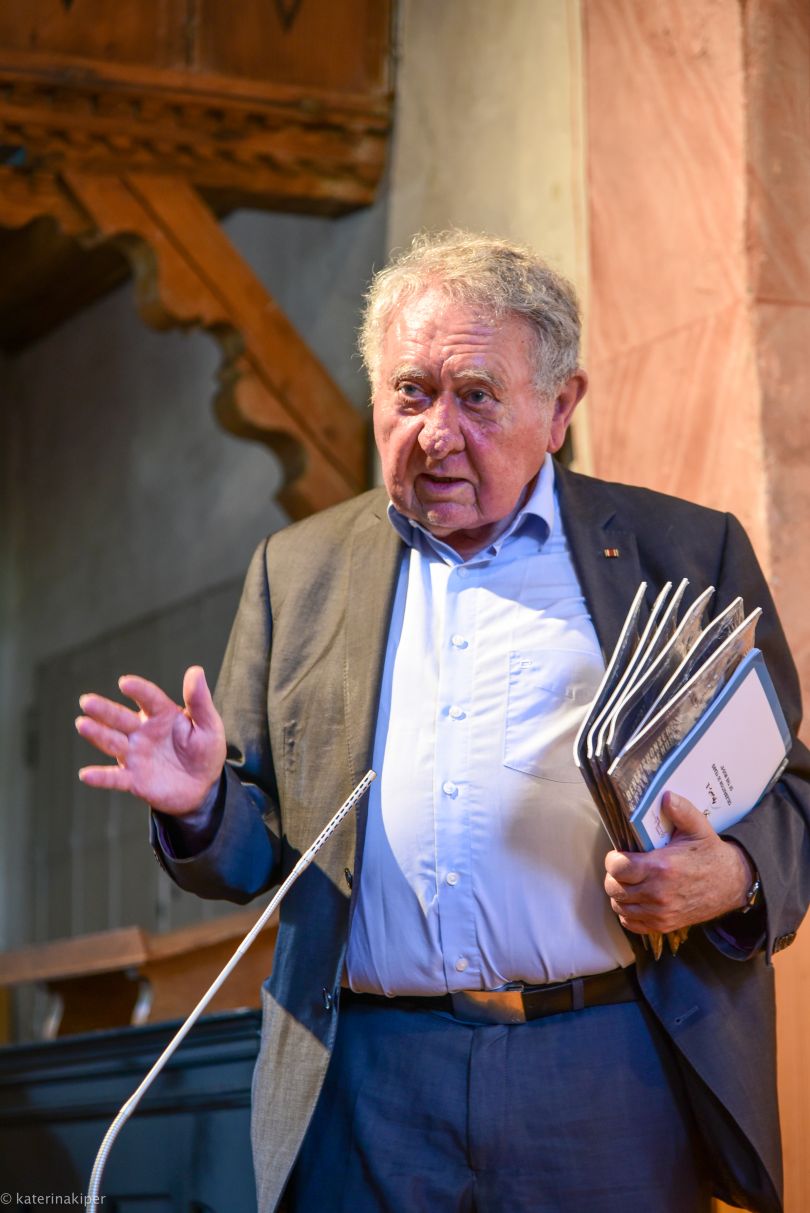
By the way, we have plans to open MUS-E ® in Odesa.
It's very interesting to learn about your history in Ukraine. It is related to my friendship with Yehudi Menuhin. He established the International Yehudi Menuhin Foundation (IYMF) in 1991 not to formulate concepts, but to bring his vision of humanity to life. At that time, Yehudi had close ties to the UNESCO United Nations, which made it easier for him to influence this process.
In 1993, we hosted a conference together, and that's when MUS-E ® started. In the following year, 1994, IYMF organized a charity concert with the title «All the world's violins» a theme that could be described as «The Voice of Peace». Musicians from all over the world participated, from Latin America, across Europe, and beyond. These types of concerts took place annually and were highly successful, like «The voice of Peace».or «Menuhin’s dream»
In the 1994 concert program for string instruments, a bandurist accompanied by a soprano was featured. Their performance was a real delight. Then, Yehudi announced from the stage that a portion of the concert proceeds would go to support gifted children in Ukraine from socially vulnerable backgrounds.
After the concert, I asked, «Yehudi, you promised this to the audience, what should we do now?» He replied, «It's very simple. You will go to Kyiv and select the children».
So, in November of that year, I arrived in Kyiv, where I visited the Mykola Lysenko School. Finding gifted children wasn't too difficult, but the painful part for me was the selection process.
The social situation in Kyiv was very challenging at that time. I remember one morning I saw an elderly lady on the street with a sack of potatoes, and in the evening, she was still in the same place... And I thought, «What are we doing?! We tell these kids, train hard, and you will succeed. But the country as a whole is struggling». So, I decided that we needed to find a way to help economically, not just talk about culture and art.
During my stay in Kyiv, I initiated the establishment of the international Ukrainian branch of ESTA (European String Teachers Association). A few years later, its vice president came to me and expressed a shared desire to hold an international conference in Ukraine. The idea of developing something significant in Eastern Europe was very important to me.
In 1999, together with the Secretary-General of ESTA, we traveled to Kyiv. During that visit, we had many interviews and meetings. One day, at the Austrian Embassy, we met a woman responsible for culture. She said, «Don't focus on Kyiv, they already receive enough support here. Go to Odesa». I found this name very intriguing, so we headed to Odesa, where we visited the renowned Professor Stolyarsky Specialized Music School. That's where we organized the conference in 2000.
One of the obstacles back then was that only Austrian Airlines operated flights to Odesa, and they could only accommodate a maximum of 30 people per day. We were planning to have 120–150 participants from Western Europe. So, I entered into a contract with Malev Airlines for a charter flight from Budapest to Odesa, which allowed everyone to reach their destination.
This was another sign for me that certain basic needs need to be addressed. It's not enough to only care about music education, although it is crucial — I am a cellist and I know what I'm talking about. We need to do more.
The conference in Odesa was very successful. Tetiana Markova was a vice director of that school, and she proposed implementing an exchange program between Odesa and the Bern Conservatory, where I was the director for 20 years.
We agreed, why not? Odesans did an excellent job, making the conference a success. Through the exchange program, over a thousand young people have participated in bilateral projects. One of the most significant was the Youth Symphony Orchestra of Bern, which we organized in 2002. 72 young musicians traveled to Odesa, and we invited 44 local participants, forming a large orchestra. Then we went to Sudak in Crimea, where we performed had a sort of musical camp at a sanatorium belonging to the UAF (Ukrainian Air Force). It was an unforgettable experience. As a result, we also had several concerts, one of them in Simferopil. I had never seen such packed halls before – the performance of the youth orchestra from Switzerland together with young musicians from Odesa was a unique experience for the local audience. Maybe one day, I will write a book about it.
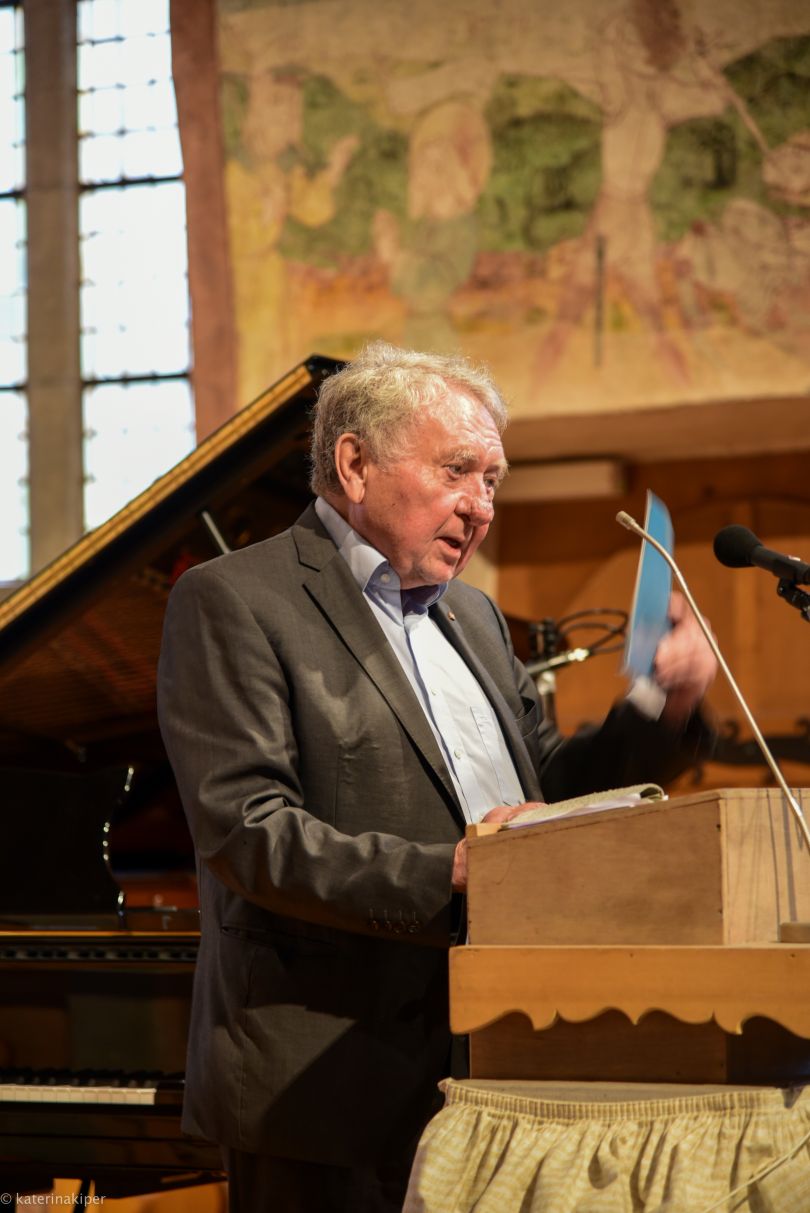
You should. Those are wonderful memories!
With each visit to Ukraine, I came closer to understanding the country's needs, the overall situation, the culture, and the mindset of its people. In Odesa, I have been 31 times, while in Kyiv, only four times.
Yes, it's a very special place, very artistic and musical.
And now, when we organized a conference in Bern in April 2023, we decided that we could start with Odesa, which can serve as an example for other regions. I know that there are different mentalities in different parts of Ukraine. I am somewhat involved in this matter because I can't be everywhere. So, I focused on these relationships.
I myself created the «LEGATO Bern-Odesa» Association. At first, no one could imagine that it would become so important. Now, I organize the provision of instruments for refugee children, looking for teachers for them. For adults, I established the New Odesa String Quartet with highly professional young musicians... I have the opportunity, and I have to do something.
So, you decided to continue the MUS-E ® idea for Ukraine. What is the main focus of MUS-E ® ?
I believe that such activities can be a great help to our country, especially considering the therapeutic aspect, which is very important nowadays.
Indeed, it has a therapeutic effect, but MUS-E ® is not just therapy. It should be a part of everyday life. The main idea of Yehudi Menuhin was that we should place art and culture at the center of society. Art is not just about creativity; it's about fostering respect and tolerance. For example, when I sit in an orchestra, I must respect my fellow musicians and listen to everyone. I should note that almost 1.5 million children have been able to participate in the MUS-E ® program. I hope there will be more, both in Odesa and in Ukraine as a whole. I know that your country has a new concept of education. I've read about it.
The New Ukrainian School.
Yes. And there are many aspects written in it, just as we talk about in the MUS-E ® program. But now I see that in addition to the difficulties caused by the military situation, the problem is that the school system in Ukraine is very strict and authoritarian. You shouldn't be so authoritarian when you agree with the approach that children learn through play. This should not be the case, and I can prove it based on several studies. By the way, I am also the president of MUS-E Association in Germany. There, we closely collaborated with the Pedagogical University of Heidelberg, and all their staff concluded that the MUS-E ® program is fantastic!
Who supports you? Who are your main donors?
It varies from country to country. In Switzerland, the Canton of Bern covers 90% of the total costs. In St. Gallen, the Canton pays 30%, another 30% comes from the municipality, and the rest is from private funding. In Germany, it's much more challenging – we always have to find private funding. In Switzerland, most initiatives come from the bottom up. Projects proposed from the top often don't succeed. So, it's not always effective to speak with high-ranking officials – projects can come to a halt. But if a school is interested, it can convince its community, and then there's progress. However, we still need to find the money. In Switzerland, it's much more expensive than in other countries. For example, an artist in the MUS-E program in Kosovo receives 15 euros per lesson, while in Switzerland, it's 100 Swiss francs for the same work.
Is the program still ongoing in Kosovo?
Yes, and that's wonderful! It started in 2010 after the war. Funding there comes from abroad. Perhaps they had some grants from the ministry, but mostly, funds come from the Swiss Development Department, the EU, or, for example, the German Embassy. Now they have a strong connection with Terre des Hommes, a humanitarian organization in Lausanne. In Kosovo, there is a big problem with homeless children, with 40% of kids not attending school. But Terre des Hommes has established centers where they come because there are MUS-E artists. If I were to summarize the answer to your question, I would emphasize that our program doesn't have a single funding model.
I believe that grants are the only way for Ukraine because the state can support but won't finance it.
What type of art is the MUS-E ® program focused on?
MUS-E ® is not about classical art; it's about any form of art. It can be dance, pop music, capoeira. Even a rap singer can become an artist in the MUS-E ® program. We have no limits for artistic expression. The decision about who comes to the school for a lesson is made by the responsible teacher, and MUS-E ® involves a coordinator who ensures a balance between the artist, the child, and the teacher. This triangle is always in balance. For example, MUS-E ® Switzerland hires a coordinator responsible for 20 school classes.
What are the requirements for an artist to participate in the program? Because not everyone can be a part of it.
They need to be open to working with children. Of course, an artist doesn't need to become a teacher, but they should have a proper understanding of the development of children of a certain age. Additionally, the artist's charisma should attract children. This is usually not a problem. We offer training for artists or create conditions for them to exchange experiences. This should be done in every country. In Spain, the whole country is part of MUS-E ®, throughout the territory!
That's great! How did they manage to achieve that?
In many countries, like Switzerland, if you go to church, you have to pay a religious tax. Many people leave the church to save money. If people leave the church in Spain, they can't leave the church, but they don’t save money, they have only the option to direct their taxes towards culture or social initiatives. I think it's a fantastic solution.
By the way, one of the problems I felt in the context of Ukraine is that art in your country is strongly associated with competition. Children growing up here are constantly in a paradigm of «Competition. Competitiveness. Contest». Our goal is not to ignite competition; we are developing skills and creativity.
I played the piano in a music school for 11 years, and I know what you're talking about. Despite giving up the idea of becoming a professional musician, music has given me a lot – creativity, intuition...
And that's what we believe in. It was important both for that conference and for creating amateur orchestras. Music should not only be valued when someone becomes a professional musician; it should always be valued. I remember once we landed in Odesa, and in the early years, there were always soldiers at the airport entrance. At that time, I had a conversation with a friendly soldier. She asked me what I was planning to do in the city, and I said I planned to visit the Stolyarsky Music School and bring some instruments from Switzerland. She mentioned that she used to study at that school and played the trombone but quit because she didn't plan to become a professional musician.
Yes, that's mostly how it goes. If you don't pursue it as a profession, you usually don't continue with music.
During my time at the conservatory, I had 3200 students, and about five of them became professional musicians each year. For the others, it was a value for a lifetime. It broadens the mind.
Absolutely! Music and creativity truly change one's perception of life.
By the way, the building opposite where we are sitting is the concert hall that I created (Yehudi Menuhin Forum, Bern). In the past, it was a Free Christian church, and it still owns the building. For nearly 14 years now, we have been operating as a concert hall and conference center. It works wonderfully. But now I've found a way to create a non-profit foundation to buy and renovate the building. It's under preservation, but we're working with an architect to show how it can be done well.
I know that in Switzerland, there are empty churches, often used for cultural projects.
Yes, but this building is absolutely unique. The acoustics in the hall are fantastic. That's the main reason why I founded this company. We invested half a million in new seats, lighting, and the stage, and we have a top-notch Steinway piano.
I apologize, but how old are you?
I'm 77. That's an age when you can relax, travel...
What motivates you to be so active at your age?
Traveling and relaxation are not what interests me. Meeting people like you is much more interesting. It inspires me. My idea is that we are here on Earth to help and create Something.
Photo by Katerina Kiper
